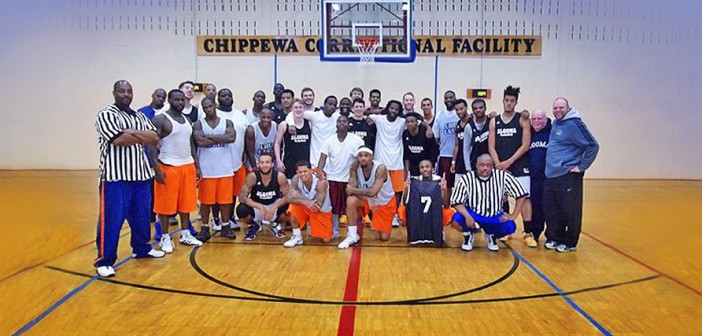In late October, the Algoma Thunderbirds men’s basketball team experienced life behind bars. The team ventured to the men’s Chippewa Correctional Facility in Kincheloe, Michigan to go head-to-head against hardened criminals in an exhibition game. It was the first-time in the history of the Chippewa Correctional Facility that a university level squad entered the facility to take on the prisoners.
After Algoma University approved travel and participation in the Chippewa Correctional Facility friendly scrimmage, the inmates began to form their team, going through similar tryouts and rigorous cuts like those done in the OUA. One of the most anticipated events of the year for the prison, prisoners were eager to earn a coveted spot on the team to compete against the first-ever university level squad – let alone a CIS team – allowed inside. “Prisoners were anticipating this event for weeks. Very seldom do they get to play an outside team, let alone a university team. Competition for the 12 roster spots was intense with several hundred prisoners hoping to be selected,” said Martin Terrian, spokesperson for the Kincheloe facility. Through process of elimination, 12 inmates were chosen to play against the Algoma Thunderbirds, while additional inmates made up the coaching staff, officials, and scorekeepers. The team was allowed to practice together for the first time during the week leading up to the game.
Unlike the Thunderbirds, who continuously build upon its pre-existing team each year by adding new talent, this was a one-time prison team, since the Chippewa Correctional Facility does not have a stand-alone facility basketball team. Instead, prisoners play pick-up games daily and participate in organized leagues throughout the year where they play against each other. Occasionally, inmates have the opportunity to play against religious outreach groups.
Security was on high for the game, with the Thunderbirds and inmates being thoroughly checked in and screened in advance. Plus, only prisoners who had behaved appropriately leading up to the game were eligible to participant. “The security level and behaviour of the prisoner determines how much he gets use of recreational areas. All physical activity is considered part of rehabilitation, whether its basketball, walking, lifting weights, etc. It is also a good behaviour tool for the administration. If prisoners behave they will be allowed to participate in extra-curricular activities [including basketball scrimmages].”
Both squads reaped the benefits of this friendly game. For the Thunderbirds, they notched a win by 14 points against the prisoner home team. But the big win was of less importance than the experience and real-life look into the lives of prisoners. “It was an outstanding experience for the boys,” said men’s Head Coach Thomas Cory. “It’s an experience that you can’t put into words – emotions were high that day. Being inside those walls really made you think and look at your own life. One little mistake and you can be behind bars for life. I think that was a key message for our players. It made them re-evaluate some of their life choices.”
For the prisoners themselves, they were able to connect with the outside world. “Most of these prisoners will be going home some day and will be back in our communities. It is easy for them to become institutionalized. Bringing in members of society helps them to remember that they are human and [allows them to]use some of their social skills. Sports in general is one of the few things that can overcome the barriers they have inside prison. For th[ose]90 minutes they were on the court, they forgot they were prisoners and they were just basketball players,” added Terrian. Other workers mentioned that this was the happiest the prisoners had been since they had started working in the facility, giving the Algoma team a sense of gratification in doing something meaningful and productive.
Before regulation play, the Thunderbirds had the opportunity to meet and talk to four of the inmates for 40 minutes. With many of the Thunderbirds studying law and justice, sociology, and psychology at the University, their opportunity to talk one-on-one with someone charged with a criminal offense and living in an institutionalized setting, was more valuable than any textbook and classroom discussion. For fifth year player and Co-Captain of the squad Brett Zufelt, the opportunity to play was surreal: “Our trip to the Chippewa Correctional Facility was one of the most eye opening and surreal experiences I have yet to experience while playing for the varsity basketball team. Getting the chance to play against and hear personal stories from inmates allowed us to see a different side of society none of us had experienced before. Listening to the inmates’ stories touched each of us differently but it was evident that what they were saying resonated with us all. The stories helped us remember how fortunate we were to be where we are today.”
Win or lose, the Thunderbirds are sure to return next off-season for another exhibition game.



1 Comment
As usual the Northern Hoot publishes an excellent article on unique and important goings on in the Algoma District. Great article and thanks to Algoma U for letting it happen!